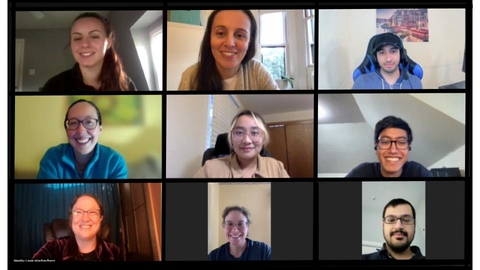New report from UMass School of Public Policy examines COVID-19's impact on Massachusetts households
A new report released by the UMass Amherst School of Public Policy (SPP) reveals some of the impacts that the first year of the COVID-19 pandemic had on Massachusetts households. Led by UMass Amherst economist Marta Vicarelli, the team from SPP’s Sustainable Policy Lab surveyed more than 2,600 Massachusetts residents from Oct. 4, 2020 to Feb. 18, 2021 to gather information about the challenges households faced due to the public health crisis and its socio-economic fallout, and the strategies adopted to address these challenges.

The survey covered a wide range of topics, including employment and financial strains, childcare and education, physical and mental health, substance use and food security. Vicarelli said the team’s analysis devoted particular attention to women, children and minority populations.
Vicarelli said, “Our results shed light on the socio-economic and health impacts of the COVID-19 pandemic in Massachusetts households across different socio-economic groups. Many of these impacts have been persisting throughout the pandemic. Special focus is devoted to delays in children’s academic and emotional development, negative mental health outcomes, and negative effects on women’s employment. If not addressed quickly, these socio-economic impacts will have lasting, and possibly irreversible, implications for the United States. We hope that our results will inform the design of policies that address these impacts and support vulnerable groups.”
Participation in the online survey was voluntary. While the respondents of the survey did not reflect the overall demographics of the Commonwealth, Vicarelli said their answers to the researchers’ questions help to clarify the strain the pandemic brought to Bay State homes and businesses. The survey also collected abundant qualitative data. Respondents who shared their stories and their contributions are included in the report providing context for the descriptive statistics. Distribution of the survey among Massachusetts households was supported by the International City/ Council Management Association (ICMA), the Massachusetts Municipal Association (MMA), the Women’s Fund of Western Massachusetts and the Boston Women’s Fund.
The survey found that 31% of respondents saw a decrease in overall income and savings, and women were more likely than men to report having become financially dependent on their partner due to COVID-19 disruptions. Female respondents were also more likely to indicate substantial changes in their professional life to support the needs of their households, such as keeping their jobs but working fewer hours, taking an unpaid leave, leaving their job or changing job.
More than 75% of respondents with children of preschool to middle-school age indicated that their children's academic progress was hindered by the impacts of COVID-19. Children with special needs may be particularly vulnerable to COVID-19 disruptions: 63% of parents with children receiving specialized services through school have seen these services decrease in frequency, and 87% of parents with children receiving specialized services believe their child has lost some of the skills they have worked to gain due to the impacts of COVID-19 on school programs.
The team of researchers from UMass Amherst, Amherst College and Indiana University also found respondents reported significant impacts on their mental health.
“The COVID-19 crisis and its socio-economic fallout have increased demand for mental health services,” Vicarelli says. “Our cross-sectional study tells a story about how COVID-19 and major alterations to our day-to-day lives have affected mental health and substance use patterns across different socio-economic groups. The patterns we have identified mirror the general U.S. population and continue to endure. For example, we find that young adults, ethnic/racial minorities, and low-income groups experienced disproportionately worse mental health outcomes. These groups should be prioritized in developing policies and programs to increase access to mental health.”
Among the policies and resources the survey respondents said would be most helpful to households coping with the COVID-19 crisis were one-time stimulus payments, greater mental health support, and more support with childcare.
Vicarelli’s student team from SPP’s Sustainable Policy Lab included:
- Ali Alsadadi, Isenberg School of Management
- Meredith Canada, School of Social Work at Indiana University, where she is completing her doctoral studies. She is a public health analyst for the Indiana Overdose Response Strategy.
- Yu Ya Htut Tin, Departments of Economics and Mathematics
- Anna Gishin, Department of Economics and Isenberg School of Management
- Madeline Leue, School of Public Policy
- Elizabeth Murphy, School of Public Policy
- Aryen Shrestha, Amherst College and Research Fellow at UMass Amherst
- Yash Tyagi, Department of Economics and Isenberg School of Management